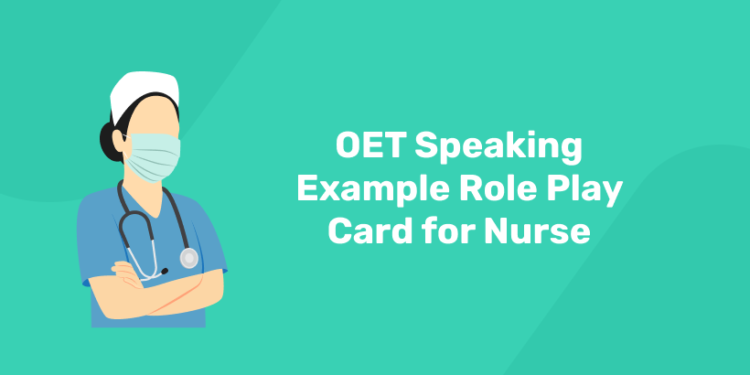Table of Contents
Introduction
The Occupational English Test (OET) is a key assessment for healthcare professionals who want to work in English speaking countries and among the various components of the test, the OET Speaking sub-test is the most important as it not only tests a candidate’s English language proficiency. But also their ability to communicate effectively in real life clinical situations which is critical for good patient care.
For nurses this test is especially important as it tests their ability to handle various scenarios they may encounter in their daily work, from explaining complex medical conditions to patients, to empathising with patients and working with other healthcare professionals, all of which are essential skills for nurses. In this blog post we will look at an example of an OET Speaking role play card for nurses, break down the task and share top tips to help you perform well in this part of the test.
Task
1: What is the primary purpose of a patient’s discharge summary?
The OET Speaking sub-test has two role play scenarios that simulate typical situations a nurse may encounter in a healthcare setting, which tests the candidate’s language proficiency and ability to respond to clinical situations with empathy and professionalism. During the test, examiners will give candidates a role-play card that outlines the context of the interaction, the characters involved, and the goals they need to achieve during the conversation. Candidates must read and understand the task thoroughly, as it forms the basis of their responses and overall performance in the role play.
Crack OET & Boost Your Healthcare Career!
OET Coaching by Entri App: Get expert guidance, practice with real exam scenarios, and achieve your target score to advance your healthcare career.
Join Now!Role Play Conversation
Here’s an example of how an OET Speaking role play might look like in a nursing context.
Role Play Scenario
Context: A patient has just been diagnosed with hypertension.
Characters:
- Nurse
- Patient (Mr. Smith)
Nurse’s objectives:
- Explain what hypertension means in simple terms.
- What does this mean for the patient?
- Practical advice and information about medication.
Example Role Play Conversation
Nurse: Good afternoon, Mr. Smith. I know you’ve just been diagnosed with hypertension. How are you feeling? It’s normal to feel concerned about a new condition.
Patient: I’m a bit overwhelmed. I’ve heard hypertension can be serious.
Nurse: I understand. Hypertension means your blood pressure is high, which can cause complications if unmanaged. But with treatment and lifestyle changes, you can live a healthy life.
Patient: What does this mean for my daily life? Will I need medication forever?
Nurse: Many patients take medication to lower blood pressure, but some can manage it with lifestyle changes like a healthier diet, more exercise, and stress management.
Patient: That sounds good. What changes should I make?
Nurse: Focus on a heart-healthy diet: reduce salt, eat more fruits and vegetables, and limit saturated fats. Aim for 150 minutes of physical activity a week, like walking or swimming. Would you like to set some exercise goals?
Patient: Yes, please. I want to improve my health.
Nurse: Great! Let’s create a plan that works for you and schedule follow-up appointments to track your progress and adjust treatment as needed.
Patient: Thanks.
Nurse: You’re welcome. If you have more questions, don’t hesitate to ask. I’m here for you every step of the way.
This shortened conversation still addresses the key points of managing hypertension with clear communication and emotional support.
OET Speaking Tips
To do well in the OET Speaking sub-test and overall to improve your speaking, consider these tips:
-
Read the Role Play Card Carefully:
- Before you start the role play, take the time to read the role play card, it has all the information about the context, character dynamics and what you need to achieve, which will guide your conversation and responses throughout.
-
Practice Healthcare Scenarios:
- Practising common healthcare scenarios with a study partner will help you build confidence and fluency in your responses and help you navigate the role play better during the actual test.
-
Use Simple Language:
- Use clear and simple language that patients can understand, don’t use medical jargon unless necessary and be prepared to explain any technical terms that come up during the conversation.
-
Show Empathy:
- Make sure to show empathy during the role play, acknowledging the patient’s feelings and concerns creates a supportive environment and helps you build rapport with the patient.
-
Manage Your Time:
- Practice managing your time during the role play to make sure you cover all the objectives without rushing or dragging the conversation, time management is key to a smooth flow of conversation.
-
Get Feedback:
- After the role plays get feedback from peers or mentors, constructive feedback will give you valuable insight into what to improve and help you fine tune your speaking.
-
Non Verbal Communication:
- Pay attention to your body language, eye contact and tone of voice, non verbal cues are key to showing empathy and building rapport with patients, to overall communication.
-
Stay Calm:
- Although you will be nervous before the test, stay calm and be confident will make a big difference, take deep breaths and remind yourself you are prepared.
-
Be Prepared for Unexpected Questions:
- During the role play, be ready to handle unexpected questions or concerns from the patient, as practicing flexibility in your responses will help you navigate the conversation smoothly.
10. Familiarize Yourself with the OET Format:
- Understanding the structure of the OET Speaking sub-test, including the types of scenarios and skills assessed, reduces anxiety and empowers you to perform better on exam day.
OET Coaching for Nurses
For nurses starting OET journey, the right coaching platform makes a huge difference in their success and Entri’s OET Coaching for Nurses is the best choice, providing comprehensive support and expert guidance specifically designed for aspiring healthcare professionals. Our curriculum emphasizes the Speaking test and delivers personalized learning experiences that address individual strengths and weaknesses, ensuring comprehensive preparation for the OET for every candidate.
Why Entri for OET Coaching?
- Expert Guidance: Entri connects students with faculties who have in-depth knowledge of OET and healthcare industry so they can guide students through the exam complexities.
- Personalized Study Plans: Each student gets a customized study plan that suits their learning style and pace so they can cover all the topics comprehensively and efficiently.
- Mock Tests and Practice Materials: Entri has plenty of practice materials and mock tests that simulate real exam environment so students can practice under real conditions and build confidence.
- Live and Recorded Classes: With the flexibility to attend live classes or recorded sessions at their own time, students can learn at their own pace and revisit complex topics as and when needed, making the learning process efficient.
-
If you want to succeed and take control of your future in healthcare, enrolling in Entri’s OET Coaching for Nurses is the first step towards your OET goals. Visit Entri’s OET Online Classes for Nurses to learn more and get started today.
Conclusion
Passing OET Speaking test requires a multi faceted approach that combines language proficiency, empathetic communication and practical knowledge so nurses can interact with patients and address their needs in clinical setting. By understanding the role play scenarios and practicing well, candidates can improve their communication skills and face real life situations in their professional career.
Entri’s OET Coaching for Nurses provides valuable resources and expert guidance to help you ace the exam, whether you are starting OET preparation or fine-tuning your skills. With personalized approach to learning and focus on practical application, Entri helps students build the confidence to succeed in OET Speaking test and beyond.
Take this opportunity to invest in your future in healthcare—enroll in Entri’s OET Coaching today and unlock your full potential!
Crack OET & Boost Your Healthcare Career!
OET Coaching by Entri App: Get expert guidance, practice with real exam scenarios, and achieve your target score to advance your healthcare career.
Join Now!Frequently Asked Questions
What is the Occupational English Test (OET), and why is it important for nurses?
The Occupational English Test (OET) is an internationally recognized English language proficiency test specifically designed for healthcare professionals, including nurses. The OET assesses candidates’ ability to communicate effectively in a healthcare environment, focusing on the language skills necessary for success in their respective professions. For nurses, passing the OET is crucial as it demonstrates their proficiency in English, which is essential for providing safe and effective patient care, understanding medical terminology, and collaborating with colleagues in English-speaking countries. Moreover, many regulatory bodies and employers require OET scores as part of the licensing or employment process, making it a vital component of a nurse’s career progression.
What does the OET Speaking sub-test entail for nurses?
The OET Speaking sub-test consists of two role-play scenarios that simulate typical interactions a nurse might encounter in their everyday practice. Each role play is designed to assess a candidate’s ability to communicate effectively in a clinical setting, focusing on their language proficiency, interpersonal skills, and ability to engage with patients and colleagues. During the test, candidates receive a role play card that outlines the context, characters involved, and specific objectives they must achieve within the interaction. This format allows examiners to evaluate how well candidates can explain medical conditions, address patient concerns, provide information, and demonstrate empathy—all essential skills for nurses working in healthcare.
How can I prepare effectively for the OET Speaking sub-test?
Preparing for the OET Speaking sub-test requires a combination of language practice, role-play simulation, and understanding the test format. Candidates can enhance their preparation by engaging in the following activities:
- Practice Common Scenarios: Familiarize yourself with typical healthcare interactions, such as communicating with patients about diagnoses, treatment plans, and medication.
- Role-Play with Peers: Partner with fellow candidates or colleagues to practice role-play scenarios, allowing you to gain confidence and refine your responses.
- Seek Feedback: After practicing, request feedback to identify areas for improvement, such as clarity of communication, empathy, and adherence to the role play objectives.
- Use Resources: Leverage study materials, online courses, and OET preparation platforms, such as Entri’s OET Coaching for Nurses, which offer targeted training and mock tests to help you succeed.
- Record Yourself: Consider recording your practice sessions to evaluate your speaking skills, body language, and tone of voice, which are crucial for effective communication.
What types of role play scenarios can I expect in the OET Speaking test?
The role play scenarios in the OET Speaking test are designed to reflect real-life situations that nurses commonly encounter in their clinical practice. Candidates may face role plays involving:
- Explaining a medical diagnosis to a patient and addressing their concerns.
- Discussing treatment options and potential side effects with patients.
- Providing discharge instructions and follow-up care details.
- Educating patients about lifestyle modifications for chronic conditions.
- Communicating with family members about a patient’s health status and care plan.
These scenarios assess not only language proficiency but also the candidate’s ability to demonstrate empathy, understanding, and professionalism in their interactions.
How does Entri’s OET Coaching specifically help nurses prepare for the Speaking sub-test?
Entri’s OET Coaching for Nurses offers a comprehensive and tailored approach to preparing for the OET Speaking sub-test, providing valuable resources and expert mentorship designed to enhance candidates’ skills and confidence. Key features of Entri’s coaching include:
- Expert Instruction: Learn from experienced instructors who are well-versed in the OET format and healthcare communication, providing insights and strategies to excel in the exam.
- Personalized Study Plans: Each candidate receives a customized study plan based on their strengths and areas for improvement, ensuring efficient and targeted preparation.
- Mock Tests and Practice Materials: Access a wide range of practice materials and mock tests that simulate the real exam environment, allowing candidates to familiarize themselves with the test format and build confidence.
- Live and Recorded Classes: Attend live classes for real-time interaction or watch recorded sessions at your convenience, allowing for flexible learning that fits your schedule.
- Focus on Practical Application: The curriculum emphasizes practical communication skills and real-world scenarios, preparing candidates to navigate the challenges they will face in their nursing careers.
What should I do if I feel nervous on the day of the OET Speaking test?
Feeling nervous on the day of the OET Speaking test is completely normal, as many candidates experience anxiety in high-stakes situations. To manage your nerves and perform at your best, consider implementing the following strategies:
- Prepare Thoroughly: Being well-prepared can boost your confidence, so take time to review your materials and practice role-play scenarios leading up to the test.
- Practice Relaxation Techniques: Engage in relaxation exercises, such as deep breathing or mindfulness meditation, to calm your mind and body before the test begins.
- Arrive Early: Give yourself ample time to arrive at the test center, allowing you to settle in and acclimate to the environment before your speaking assessment.
- Focus on the Task: During the role play, concentrate on the objectives outlined in the role play card rather than your nerves. Stay present in the conversation and focus on effectively communicating with the examiner.
- Remember It’s a Simulation: Remind yourself that the speaking test is a simulation of real-life interactions, and approach it as an opportunity to showcase your skills rather than a stressful evaluation.
How are the OET Speaking tests evaluated, and what criteria are used?
The OET Speaking tests are evaluated by trained examiners who assess candidates based on specific criteria that reflect their ability to communicate effectively in a healthcare setting. The evaluation focuses on several key components:
- Language Proficiency: Candidates are assessed on their ability to use appropriate vocabulary, grammar, and pronunciation while communicating clearly and fluently.
- Communication Skills: This includes the ability to engage with the patient, listen actively, and respond to questions or concerns in an appropriate manner.
- Empathy and Professionalism: Examiners look for signs of empathy, compassion, and professionalism in candidates’ interactions, which are crucial for building rapport with patients.
- Task Fulfillment: Candidates are evaluated on how well they meet the objectives outlined in the role play card, ensuring that they address the patient’s needs and provide relevant information.
Is there a specific format that candidates should follow during the OET Speaking role play?
While there is no rigid format that candidates must adhere to during the OET Speaking role play, there are several best practices that can guide candidates toward successful interactions:
- Introduction: Begin the conversation with a warm greeting and introduce yourself to the patient, establishing a friendly rapport from the outset.
- Clarify the Situation: Assess the patient’s understanding of their condition and clarify any uncertainties they may have, which demonstrates active listening.
- Address Concerns: Be attentive to the patient’s concerns and emotions throughout the conversation, responding with empathy and reassurance.
- Provide Information: Clearly explain relevant medical information, treatment options, or lifestyle changes, using simple language that the patient can understand.
- Encourage Questions: Invite the patient to ask questions or express any further concerns, ensuring they feel supported and informed throughout the interaction.
- Wrap Up: Conclude the conversation by summarizing key points and offering your availability for further questions, reinforcing the ongoing support you will provide.
Can non-native English speakers succeed in the OET Speaking test?
Yes, non-native English speakers can absolutely succeed in the OET Speaking test, provided they take the time to prepare adequately and practice their language skills. The OET is specifically designed for healthcare professionals from diverse linguistic backgrounds, and it assesses practical communication skills in a healthcare context rather than purely academic language proficiency. To succeed, non-native speakers should focus on:
- Building Confidence: Regular practice with role-play scenarios can improve fluency and confidence in speaking English, allowing candidates to express themselves more effectively.
- Familiarity with Medical Terminology: It’s essential to become comfortable with common medical terms and phrases that are relevant to nursing, as this will enhance communication with patients.
- Engaging in Real Conversations: Participating in conversations with native speakers or other healthcare professionals can provide valuable experience and improve language skills in a practical setting.
What resources are available for nurses preparing for the OET Speaking test?
Nurses preparing for the OET Speaking test have access to a variety of resources that can aid in their preparation and enhance their skills. Some valuable resources include:
- Online Courses: Platforms like Entri offer specialized OET coaching for nurses, providing comprehensive training, mock tests, and expert mentorship.
- Study Guides: Many publishers provide OET-specific study guides that include practice questions, role-play scenarios, and tips for success in the Speaking sub-test.
- Practice Groups: Joining study groups or forums where candidates can practice speaking and share resources can be beneficial for building confidence and receiving feedback.
- YouTube Tutorials: Numerous educators create free online content that covers OET preparation strategies, speaking techniques, and common scenarios encountered in the test.
- Mobile Apps: Language learning apps can help candidates practice speaking, vocabulary, and listening skills on the go, making it easier to integrate study into their daily routines.











